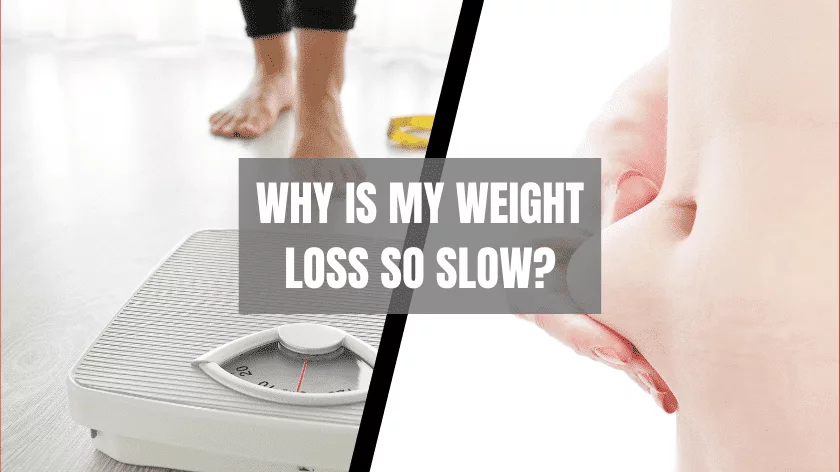The road to success never comes easy when it comes to losing weight. Often, people give up because they don’t see results fast enough, asking themselves – why is my weight loss so slow?
The thing is, a weight loss journey is not always a linear path. Sometimes, progress slows down, and you feel like you’re getting nowhere.
During these times, you must remind yourself that weight loss is a process that takes time and won’t happen overnight.
Carrying around a lot of water weight, a slow metabolism, or eating more calories than you realize are common reasons for stalling on your weight loss journey.
If you’re struggling to lose weight, continue reading to discover more about the common reasons why and what you can do to avoid derailing your progress.
Weight Loss Plateaus: Explained
The scale is usually your best friend when you’re trying to lose weight. But there will be times when it seems like your weight loss has come to a screeching halt, even though you’re still following your diet and exercise plan. This is called a weight loss plateau, and it’s normal for most people trying to lose weight.
There are a few things that can cause a weight loss plateau, including:
- Your body becomes more efficient at burning calories, so you may need to adjust your diet or increase your activity level to continue losing weight.
- You may be losing fat but gaining muscle, so the scale may not reflect the changes in your body composition.
- You may be retaining water due to stress or hormonal changes.
Burn Lab Pro – The World’s Most Advanced Fat Loss Support

Don’t let slow weight loss hold you back from achieving your body goals. Buy Burn Lab Pro to help you lose fat faster and easier. With its advanced fat loss support, you’ll feel strong and confident in your body.
Slow vs Rapid Weight Loss: Which Is Better?
There are two schools of thought regarding weight loss: slow and steady or quick and dramatic. So, which is the better approach?
Slow and steady wins the race when it comes to weight loss. Quick-fix diets may result in initial weight loss, but it’s often water weight or muscle, not fat. Plus, these diets are difficult to stick to long-term, which means the weight is likely to come back.
On the other hand, slow and steady weight loss may not be as efficient, but it’s more likely to be sustainable.
You can gradually lose weight and keep it off for good by making minor changes to your diet and lifestyle. You’re also less likely to experience the yo-yo effect often associated with fad diets this way.
Why Is My Weight Loss So Slow? – 5 Common Reasons
1. You’re not keeping track of what you’re eating
Slow weight loss can be frustrating, especially when you feel like you’re doing everything right. But one common weight-loss mistake is failing to track what you’re eating.
If you’re not tracking your food intake, it’s easy to eat more calories than you realize – especially if you consume many of your calories in the form of sugar-laden drinks. This can stall your weight loss or even cause you to gain weight if you aren’t careful.
Fortunately, there are several ways to track your food intake, including online food journals, apps, or even good old pen and paper.
By tracking your food intake, you can ensure you’re eating the right amount of calories to lose weight slowly and steadily.
2. Not including cardio and strength training in your weight loss program
You might be tempted to skip the cardio and strength training in favor of more calorie-burning activities. But beware: This strategy can result in slower weight loss.
Here’s why: When you lose weight, you also lose muscle mass. And since muscle burns more calories than fat, this muscle loss can make it harder to lose weight (and keep it off) in the long run.
Cardio and strength training help improve your body composition by making you stronger and leaner. Not only will this help with weight loss, it also makes it easier to maintain your new weight once you reach your goal.
So if you’re serious about losing weight, make sure to include both cardio and strength training in your program. You’ll see better results in the long run – and, hopefully, avoid any dreaded plateau periods along the way.
3. You’re not eating enough protein
Many people cut calories without paying attention to the foods they eat. Protein is an essential nutrient for weight loss, yet many diets are lacking in this vital macronutrient.
Protein is necessary to build and repair tissues, make hormones and enzymes, and maintain a healthy metabolism. When you cut calories and don’t eat enough protein, your body begins to break down muscle tissue for energy. This slows your metabolism and makes it more difficult to lose weight and keep it off in the long term.
Additionally, protein helps you feel fuller longer and can curb unhealthy snacking throughout the day. So if you’re looking to move the needle on your weight loss journey, upping your protein intake is in your best interest.
There are many ways to ensure you’re getting enough protein in your diet. Be sure to include plenty of protein-rich foods at every meal, such as eggs, yogurt, beans, or lean meat. For a more convenient option on the go, you may want to opt for a protein shake.
Aim for at least 0.8 grams of protein per pound of body weight per day for best results, as that’s the minimum average amount adults need per day [1].
4. You’re eating too many calories
Even if you’re diligently tracking your calorie intake and ensuring it’s below what you’re burning, you may still not lose weight as quickly as you’d like.
Part of the reason may be that you’re overestimating how many calories you’re burning and underestimating how many calories are in the food you’re eating.
An optimal strategy when looking to lose weight is to implement a daily deficit of 200 to 300 calories through diet and exercise.
You may be tempted to go for an even larger deficit from the outset, but this is likely to become increasingly unsustainable and leaves little leeway for an increase. The best way to start is with a smaller deficit and work up from there.
And remember to be accurate when estimating the number of calories burned and consumed. A few hundred extra calories here or there can add up quickly and stall your weight loss.
5. You have a medical condition
Most people know that having a medical condition can make life more difficult in general. But, what many don’t realize is that having a medical condition can also slow down your weight loss progress.
For example, if you have diabetes, you’ll need to be careful about the types of foods you eat and how much insulin you take. If you have heart disease, you’ll need to focus on getting enough exercise and eating heart-healthy foods.
No matter what your particular medical condition is, working with a doctor or a registered dietitian can help you create a safe and effective weight loss plan.
Why Is My Weight Loss So Slow? – The Bottom Line
It’s important to remember that weight loss progress happens slowly and doesn’t happen overnight. As the old saying goes: Rome wasn’t built in a day!
Don’t be discouraged if you don’t see results immediately, as it takes time and consistency to see change. Trust the process and stay patient – eventually, you will reach your goals.





Leave a Reply